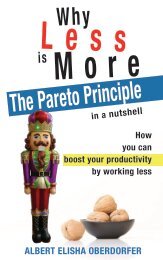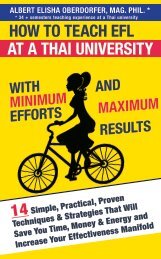POWER PRINCIPLES - ALBERT ELISHA OBERDORFER
Power principles are a kind of unwritten law. They are universal truths. They are what the law of gravity is in the realm of physics. Modern aviation is built on identifying aerodynamic principles and then applying those principles in the design and use of airplanes. They work for everyone. At all times. It is the same with those power principles. Once we learn to work with these principles, we will see their powerful effects. Get ready to learn about and then apply powerful principles such as: - THE POWER OF FOCUS, - THE POWER OF WHY, - THE POWER OF A MISSION STATEMENT, - THE POWER OF AN ACTION PLAN, - THE POWER OF A DEADLINE, - THE POWER OF A CHECKLIST, - THE POWER OF THE PARETO PRINCIPLE, - THE POWER OF IMMEDIATE ACTION, - THE POWER OF A COMPLETED TASK, - THE POWER OF REPETITION, etc. and - THE POWER OF LOVE.
Power principles are a kind of unwritten law.
They are universal truths.
They are what the law of gravity is in the realm of physics.
Modern aviation is built on identifying aerodynamic principles and then applying those principles in the design and use of airplanes.
They work for everyone.
At all times.
It is the same with those power principles.
Once we learn to work with these principles, we will see their powerful effects.
Get ready to learn about and then apply powerful principles such as:
- THE POWER OF FOCUS,
- THE POWER OF WHY,
- THE POWER OF A MISSION STATEMENT,
- THE POWER OF AN ACTION PLAN,
- THE POWER OF A DEADLINE,
- THE POWER OF A CHECKLIST,
- THE POWER OF THE PARETO PRINCIPLE,
- THE POWER OF IMMEDIATE ACTION,
- THE POWER OF A COMPLETED TASK,
- THE POWER OF REPETITION, etc. and
- THE POWER OF LOVE.
Create successful ePaper yourself
Turn your PDF publications into a flip-book with our unique Google optimized e-Paper software.
ALBE R T <strong>ELISHA</strong> OB ERD O RFER<br />
<strong>POWER</strong><br />
<strong>PRINCIPLES</strong><br />
15 S i m p l e, D o-able L i f e H a c k s T h at W i l l<br />
M a k e Y o u Mult i p l e T i m e s More Productive<br />
1
2
<strong>POWER</strong> <strong>PRINCIPLES</strong>.<br />
<strong>PRINCIPLES</strong> are a kind of unwritten<br />
laws.<br />
They are universal truths.<br />
They are what the law of gravity is in the<br />
realm of physics.<br />
Once we learn to work with those<br />
principles, we will see their powerful<br />
effects.<br />
Modern aviation is built on identifying<br />
aerodynamic principles and then applying<br />
those principles in the design and use of<br />
airplanes.<br />
They work for everyone.<br />
At all times.<br />
3
4
If you drop<br />
a stone, it<br />
falls. That’s<br />
a universal<br />
principle.<br />
5
6
It works for<br />
everyone.<br />
Everywhere.<br />
All the time.<br />
7
8
Power<br />
principles<br />
are<br />
fundamental<br />
success<br />
principles<br />
that work<br />
regardless.<br />
9
CONTENTS<br />
<strong>POWER</strong> <strong>PRINCIPLES</strong>. 3<br />
1 THE <strong>POWER</strong> OF FOCUS. 13<br />
2 THE <strong>POWER</strong> OF WHY. 17<br />
3 THE <strong>POWER</strong> OF A MISSION STATEMENT. 19<br />
4 THE <strong>POWER</strong> OF AN ACTION PLAN. 21<br />
5 THE <strong>POWER</strong> OF A DEADLINE. 23<br />
6 THE <strong>POWER</strong> OF A CHECKLIST. 31<br />
7 THE <strong>POWER</strong> OF THE PARETO PRINCIPLE. 33<br />
8 THE <strong>POWER</strong> OF IMMEDIATE ACTION. 37<br />
9 THE <strong>POWER</strong> OF A COMPLETED TASK. 41<br />
10 THE <strong>POWER</strong> OF REPETITION. 47<br />
11 THE <strong>POWER</strong> OF A MORNING ROUTINE. 49<br />
12 THE <strong>POWER</strong> OF THE FLOW. 55<br />
13 THE <strong>POWER</strong> OF THOUGHTS. 59<br />
14 THE <strong>POWER</strong> OF WORDS. 61<br />
15 THE <strong>POWER</strong> OF LOVE. 63<br />
10
11
12<br />
Without a clear focus,<br />
everything is blurry.
1 THE <strong>POWER</strong> OF<br />
FOCUS.<br />
Another word for focus is clarity.<br />
It’s like you are looking through a lens,<br />
and everything is blurry.<br />
You would have a hard time in life if you<br />
used a pair of glasses that is completely<br />
blurry.<br />
With that, nothing that you tried to do<br />
would work.<br />
Because you couldn’t see anything<br />
clearly.<br />
But if you have a clear focus, then<br />
suddenly you will be able to understand<br />
what you should be doing to reach your<br />
goals.<br />
So step one before doing anything is to<br />
clarify your goals.<br />
What is it that you would like to achieve?<br />
What is it that you clearly want in life?<br />
Experts repeatedly say that writing goals<br />
down works best.<br />
13
14<br />
“Shoot the ball<br />
anywhere you want!”
It is not enough just to have some vague,<br />
fuzzy goals that you are holding in your<br />
head.<br />
Goals should be written down.<br />
The clearer we can be on our goals, the<br />
higher the percentage that we will achieve<br />
them.<br />
15
16
2 THE <strong>POWER</strong> OF WHY.<br />
IF YOU’RE why is clear, then this will<br />
help you when the going gets tough.<br />
Having a clear why will help you to<br />
motivate yourself to push through.<br />
So, what’s your why?<br />
17
18
3 THE <strong>POWER</strong> OF A<br />
MISSION STATEMENT.<br />
THIS IS connected with goal setting.<br />
We should have a written mission<br />
statement that clarifies in words what<br />
mission we see ourselves having in this<br />
life.<br />
The mission statement should be in line<br />
with our core values, a set of values,<br />
guiding principles that we base our life<br />
on.<br />
Our core values need to be in line with<br />
who we are as a person.<br />
So that we then do things in alignment<br />
with who we are as a person.<br />
19
20
4 THE <strong>POWER</strong> OF AN<br />
ACTION PLAN.<br />
A GOAL without a corresponding action<br />
plan is just a fantasy.<br />
So once we have clarified our goals (in<br />
writing), we then need to think about<br />
what we can do to reach that goal.<br />
This is called an action plan.<br />
Our action plan needs to be aligned with<br />
our goals.<br />
Yummy!<br />
21
22
5 THE <strong>POWER</strong> OF A<br />
DEADLINE.<br />
DEADLINES help us to get work done.<br />
Without any deadlines, probably very<br />
little ever gets done.<br />
The best are deadlines that have serious<br />
consequences.<br />
Like a deadline for submitting an<br />
assignment.<br />
When students get penalized for<br />
submitting an assignment late, they will<br />
do their best to keep the deadline.<br />
If those penalties are spelled out, and then<br />
also adhered to it works best.<br />
A man named Cyril Parkinson once<br />
postulated what has since become known<br />
as Parkinson’s Law.<br />
Parkinson’s Law says that tasks get done<br />
according to the amount of time that is<br />
allotted to them.<br />
If you have a lot of time to do a task, that<br />
is probably how long it will take you to<br />
complete it.<br />
23
24
If you have very little time, you are most<br />
likely to complete that task in that time.<br />
I remember when I was joining a studentexchange<br />
program at the University in<br />
Newcastle, Australia.<br />
I did a few Australian literature and film<br />
study courses, including a course on 19th<br />
century Australian literature.<br />
To get our grades, we were assigned to<br />
write a 2500 word paper on a particular<br />
topic.<br />
Most of the students, I included, started<br />
writing their paper one day before it was<br />
due.<br />
This meant that most would write it<br />
overnight, into the early hours of the day<br />
when it was due.<br />
A quick draft, and then a quick grammar<br />
revision. That was all.<br />
But this didn’t mean that the papers were<br />
not good.<br />
In one semester, I had to write two such<br />
papers.<br />
On the first one, I got an A, and on the<br />
second paper, I got a B.<br />
I only got the B on the second paper<br />
because I submitted it a day late, and I lost<br />
points because of that.<br />
25
26
Using this ‘technique,’ I got better a better<br />
overall grade (a B+) in that class than<br />
many of my Australian classmates.<br />
Was it because I am so smart?<br />
I don’t think so.<br />
It was because I focused all my energy, all<br />
my efforts whole-heartedly on writing that<br />
paper, without any destruction.<br />
I was totally focused on getting it done in<br />
as little time as possible.<br />
Because I had to.<br />
This brings us back to Parkinson’s Law.<br />
Imagine that there is a little fire that you<br />
need to extinguish.<br />
If the fire is still very little, we lack the<br />
urgency to do it.<br />
But the bigger the fire gets, the more<br />
urgent it is that you extinguish it.<br />
Until the fire is so big that you have to<br />
extinguish it.<br />
This is the same with deadlines.<br />
The closer we get to a deadline, the more<br />
compelling it gets to take action.<br />
But the problem is when we don’t set any<br />
deadlines.<br />
27
28
Stephen Covey, in his famous book, “The<br />
Seven Habits of Highly Effective People’<br />
noted that we can categorize tasks in this<br />
way.<br />
He suggested 4 baskets.<br />
1) Urgent and important tasks. (Tasks that<br />
we need to do anyhow.)<br />
2) Urgent and unimportant tasks. (Tasks<br />
that we should stay away from. In other<br />
words, not do them.)<br />
3) Not urgent but important tasks. (Tasks<br />
that we should focus on.) And,<br />
4) Not urgent and not important tasks.<br />
(Tasks that we also shouldn’t do, as they<br />
are classic time-wasters.)<br />
So we focus on doing tasks in basket<br />
number. Tasks that are important (that<br />
potentially have hugely beneficial effects)<br />
but are, and that is the problem, not<br />
urgent.<br />
How can we get ourselves to do those<br />
tasks if we set no clear deadlines?<br />
I think if we can come up with a clear<br />
penalty and reward system, it may help<br />
us to get going and to take the necessary<br />
action.<br />
29
30<br />
_________
6 THE <strong>POWER</strong> OF A<br />
CHECKLIST.<br />
WORKING from a checklist is timesaving<br />
and makes us more productive.<br />
That’s because if we spend time planning<br />
a task, we can then carry it out more<br />
effectively.<br />
Because we are more focused.<br />
We precisely know what we want.<br />
It’s like when you go shopping.<br />
If you spend time planning and writing it<br />
down exactly what you need to buy, you<br />
will be much more effective and efficient<br />
when you are in the shop.<br />
31
32
7 THE <strong>POWER</strong> OF THE<br />
PARETO PRINCIPLE.<br />
WILFREDO PARETO was an Italian<br />
economist who discovered what appears<br />
to be a pervasive principle that operates<br />
in all areas of life.<br />
It is the law of the vital few versus the<br />
trivial many.<br />
It is also called the 80/20 principle.<br />
In business, for example, 20 percent of<br />
customers generate 80 percent of the<br />
revenue.<br />
Twenty percent of criminals commit 80<br />
percent of the crimes.<br />
Twenty percent of drivers cause 80<br />
percent of all traffic accidents.<br />
Twenty percent of employees are<br />
responsible for 80 percent of the results.<br />
And so on.<br />
What this means is that before we are<br />
doing a task, or when we come up with<br />
our task list, we should be thinking ‘what<br />
are the most important tasks.’<br />
33
34
We can write a 1) next to the most<br />
important task and then proceed to do that<br />
task first.<br />
And after that, do the second most<br />
important task.<br />
And then the third most.<br />
And so on.<br />
35
36
8 THE <strong>POWER</strong> OF<br />
IMMEDIATE ACTION.<br />
THERE is a notable success indicator.<br />
People who take immediate action are<br />
more likely to have overall success than<br />
people who don’t.<br />
Brian Tracy, a famous success teacher,<br />
humorously refers to people who don’t<br />
take immediate action as ‘someday islers.’<br />
Those people would like to do something.<br />
But before they actually do it, they take a<br />
vacation on ‘someday isle.’<br />
And on ‘someday isle’ they meet all those<br />
someday islanders who spend all their<br />
day taking about excuses whey they are<br />
not doing things.<br />
When we take immediate action on an<br />
idea, there is always the possibility that<br />
we can then adjust the course.<br />
Or stop doing what we find is not<br />
productive.<br />
We can’t steer a boat that is mored to a<br />
dock.<br />
37
38
We can only steer it once it is in motion.<br />
The lesson in this is this.<br />
To get anywhere, we ought to first get<br />
going.<br />
We can always adjust the course afterward<br />
if need be.<br />
39
40<br />
Pure bliss!
9 THE <strong>POWER</strong> OF A<br />
COMPLETED TASK.<br />
Brian Tracy, a famous motivational<br />
speaker, puts it that way.<br />
All success can be summed up in this<br />
principle.<br />
Successful people are people who know<br />
how to complete tasks.<br />
Not working on tasks but completing<br />
tasks.<br />
He rightly says that completing a task<br />
makes us feel good.<br />
That’s because<br />
when we complete<br />
a task, we feel like<br />
a winner who has<br />
crossed the finish<br />
line.<br />
DOPAMINE.<br />
41
42
And whenever we finish a task, the<br />
brain releases a chemical that is called<br />
dopamine.<br />
We feel good.<br />
So we become addicted to completing<br />
tasks.<br />
We become addicted to succeeding.<br />
But we need to learn to manage our phone<br />
use.<br />
Because for that same reason, cell phones<br />
are so disruptive.<br />
Every time a ‘bling’ comes on, and a<br />
new message pops up, and we respond to<br />
this new stimulus, the brain also releases<br />
dopamine.<br />
The feel-good drug.<br />
But the problem with this is that every<br />
time we respond to this stimulus, our<br />
attention is broken.<br />
And it takes us 15 minutes to get back to<br />
what were doing before.<br />
So, to be able to do things successfully,<br />
we need to learn how to control our<br />
mobile phone usage.<br />
The reason why people are addicted to<br />
their phones is this.<br />
43
44<br />
Every dopamine rush gives you a little high.<br />
And you keep wanting more of it because<br />
your tolerance level keeps increasing.
Every time people respond to the stimulus<br />
on their phone, they get a dopamine rush.<br />
They get a little high.<br />
And it is like with any addiction.<br />
Their tolerance level increases.<br />
So they need to have more of it, to<br />
experience that same excitement.<br />
That’s why mobile phone use is so<br />
addictive.<br />
To break that addiction, people need to<br />
learn how to go on a dopamine detox.<br />
By putting their phones away for a certain<br />
period of the day.<br />
Otherwise, mobile phones severely curb<br />
people’s productivity levels.<br />
45
46
10 THE <strong>POWER</strong> OF<br />
REPETITION.<br />
BRUCE LEE once made this famous<br />
statement.<br />
“ I fear not the man who has practiced<br />
10,00 kicks once, but I fear the man who<br />
has practiced one kick 10,00 times.”<br />
There is power in repetition.<br />
This is how we achieve mastery in a<br />
subject.<br />
And this is how we form habits.<br />
47
48
11 THE <strong>POWER</strong> OF A<br />
MORNING ROUTINE.<br />
“MORGENSTUND hat Gold im Mund.”<br />
This is a German proverb.<br />
It literally means ‘Morning hours have<br />
gold in the mouth.’<br />
An equivalent English proverb says, “The<br />
early bird catches the worm.”<br />
There is something special about morning<br />
hours.<br />
If we can learn to harness the power of the<br />
morning by using it to focus on our most<br />
important tasks first.<br />
Just by adhering to a straightforward<br />
principle, we can become multiple times<br />
more productive.<br />
Use the most valuable time in the morning<br />
to focus on your most important tasks first.<br />
In other words, don’t waste the precious,<br />
valuable morning time on trivial things<br />
such as checking your social networking<br />
accounts.<br />
49
50
THERE IS<br />
SOMETHING<br />
SPECIAL ABOUT<br />
MORNING<br />
HOURS.<br />
51
52
Establishing a mourning routine can help<br />
you to get focused on what is essential.<br />
I start the day with prayer.<br />
I know of people who start their day with<br />
a set of songs<br />
that give them<br />
encouragement and<br />
lifts them up.<br />
I know of one<br />
person whose<br />
favorite song is<br />
Edelweiss.<br />
Whatever it is that<br />
centers you, that encourages you, that lifts<br />
you up.<br />
So that you can start your day with<br />
positivity, courage, and hope.<br />
“Edelweiss, Edelweiss<br />
Every morning you greet me<br />
Small and white clean and bright<br />
You look happy to meet me<br />
Blossom of snow, may you bloom and<br />
grow<br />
Bloom and grow forever<br />
Edelweiss, Edelweiss<br />
Bless my homeland forever.”<br />
53
54
12 THE <strong>POWER</strong> OF THE<br />
FLOW.<br />
YOU ARE more likely to get in a flow<br />
state if you can focus on a task for an<br />
extended period without interruption.<br />
That’s why are the constant sound alerts<br />
of a mobile phone so disruptive.<br />
They will severely impact your<br />
productivity level.<br />
If you let it.<br />
So to get into a flow state—a state where<br />
you can totally focus on the task in front<br />
of you, where you are entirely focused—<br />
you need to control your circumstances.<br />
Shut the door to your workroom if you<br />
have to.<br />
Put a ‘Do not disturb’ sign on the<br />
doorknob.<br />
Enable the do not disturb mode (the moon<br />
sign) on your iPhone.<br />
Put your phone in flight mode.<br />
55
56
Do whatever you need to do so that you<br />
can focus on the task in front of you<br />
without interruption.<br />
This will do wonders for your productivity<br />
and ability to focus.<br />
When you get into the flow state, you<br />
will find that you can do things almost<br />
effortlessly.<br />
You will find that time seems to stand still,<br />
and looking back, you will be amazed<br />
how quickly hours have passed that you<br />
were focused on a task.<br />
You will find that you are more creative<br />
in this state and that the mental clutter in<br />
your head will have subsided enormously.<br />
This is the power of the flow state.<br />
57
58
13 THE <strong>POWER</strong> OF<br />
THOUGHTS.<br />
THOUGHTS ARE powerful.<br />
They make us.<br />
They drive our emotions.<br />
If we can change the way we think, we<br />
can change the way we feel.<br />
To start a day productively, find<br />
something you can be grateful for.<br />
There is power in thankfulness.<br />
Whatever our situation is that we are in<br />
right now, we can always find something<br />
we can be thankful for.<br />
Once we do that and focus on what we are<br />
thankful for, our emotions will adjust.<br />
59
60
14 THE <strong>POWER</strong> OF<br />
WORDS.<br />
WORDS HAVE enormous power.<br />
They create.<br />
This is why it is crucial what we say.<br />
Because we will get what we say.<br />
The bible clearly recognizes this.<br />
In Proverbs, King Solomon, the wisest<br />
king to ever live apart from Jesus Christ,<br />
states, “Death and life are in the power of<br />
the tongue, and those who love it will eat<br />
its fruit.” (Proverbs 18:21)<br />
This means that words shape our reality.<br />
We need to be extremely careful to declare<br />
good things over our lives.<br />
61
62
15 THE <strong>POWER</strong> OF<br />
LOVE.<br />
LOVE is the most potent force in the<br />
universe.<br />
In fact, love is what holds this universe<br />
together.<br />
It was created in love.<br />
To be successful in life, we need to align<br />
ourselves with love.<br />
If we do things in love, because of love,<br />
we will find that there is an incredible<br />
positive force behind it.<br />
On the contrary, if we do things from a<br />
place of negativity, not from a place of<br />
love, we are being driven by a destructive<br />
force.<br />
The greatest description of love can be<br />
found in the bible.<br />
Paul, the great apostle, talks characterizes<br />
what love is in a letter called 1<br />
Corinthians.<br />
In the thirteenth chapter of that letter, he<br />
defines love in the following terms.<br />
63
64
“Love suffers long, and is kind; love does<br />
not envy; love does not parade itself, is<br />
not puffed up;<br />
Does not behave rudely, does not seek its<br />
own, is not provoked, thinks no evil;<br />
Does not rejoice in iniquity, but rejoices in<br />
the truth;<br />
Bears all things, believes all things, hopes<br />
all things, endures all things.<br />
Love never fails. ...” (verses 4-8)<br />
Yet, we cannot give something that we<br />
don’t have.<br />
So to operate in that kind of love, we first<br />
need to receive it.<br />
And what is the source of this kind of<br />
love?<br />
Where can we find this kind of love?<br />
There is a fascianting real-life story<br />
of a Harvard neurosurgeon, D. Eben<br />
Alexander. 1<br />
This man experienced a near-death<br />
experience due to an E. coli meningitis<br />
infection.<br />
The infection induced a week-long coma<br />
and shut down the entire cortex of his<br />
brain, which is the part of the brain that<br />
gives us consciousness.<br />
65
66
Yet while his brain was in this comma<br />
state, he experienced God as the center<br />
and source of love.<br />
The kind of love, Paul described before.<br />
67
Power Principles: 15 Simple Do-Able Life Hacks That<br />
Will Make You Multiple Times More Productive<br />
Copyright 2020 © Albert L. Oberdorfer<br />
All rights reserved. No part of this publication may be<br />
reproduced, stored in a retrieval system, or transmitted,<br />
in any form or by any means, electronical, mechanical,<br />
photocopying, recording or otherwise, without the<br />
written permission of the author.<br />
PICTURE CREDITS<br />
Unless otherwise stated all images are courtesy of<br />
Pexels.com. and Pixabay.com. The image on the back<br />
cover is from the author. Any inadvertent omissions can<br />
be rectified in future editions.<br />
68
Endnotes<br />
1 See Eben Alexander, ‘Proof of Heaven: A<br />
Neurosurgeon’s Journey into the Afterlife.’<br />
69

















